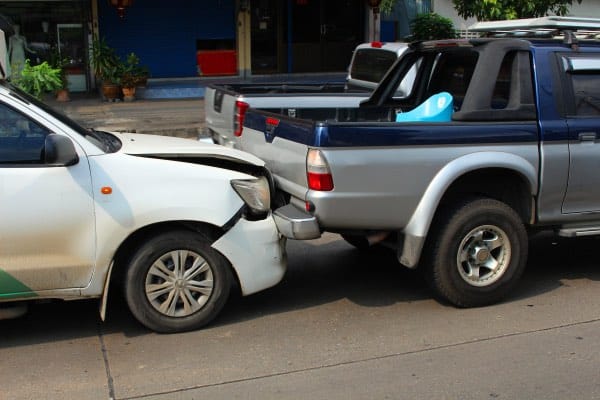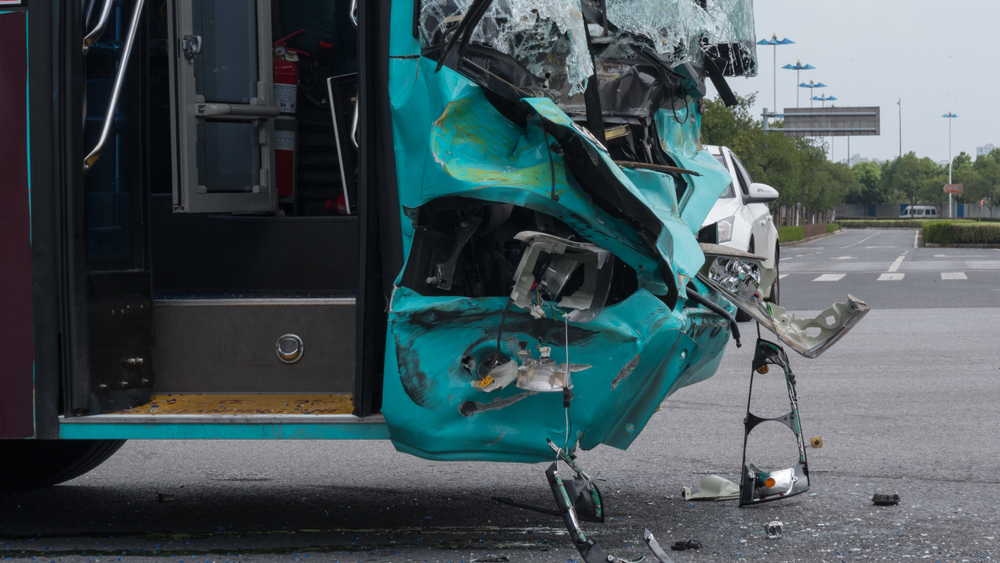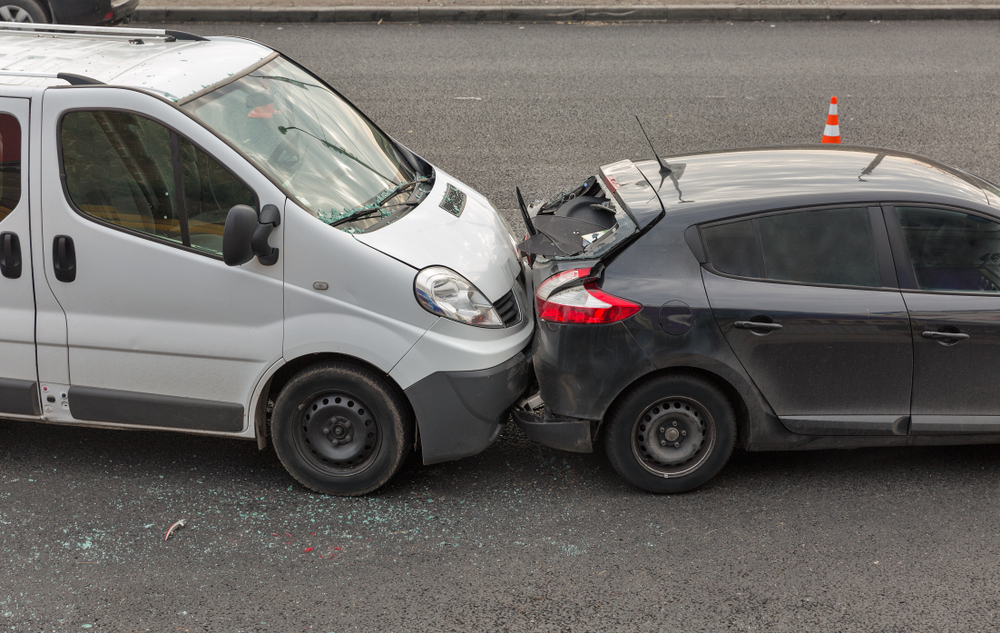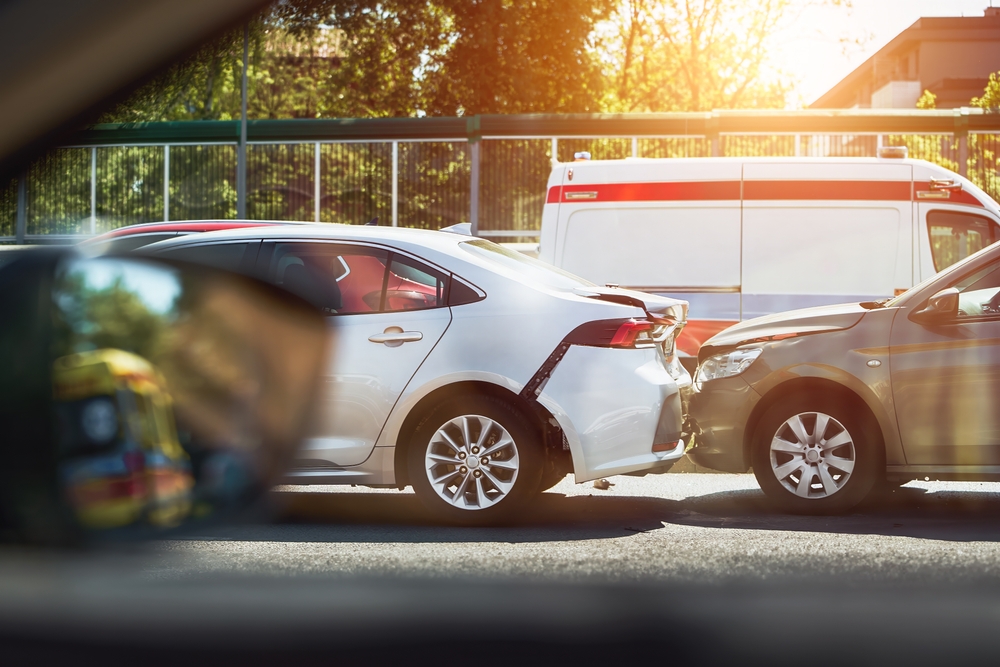
Rear-end collisions are one of the most common types of traffic accidents on Arlington roads. When another driver crashes into your vehicle from behind, the physical injuries and financial stress can disrupt your life for months or even years. You need an Arlington rear-end accident lawyer who knows Texas law and will fight aggressively to recover the compensation you deserve.
If you’ve been injured in a rear-end collision in Arlington or Tarrant County, call Branch & Dhillon at (817) 533-3430 for a free consultation. You pay no fees unless we win your case.
Key Takeaways About Arlington Rear-End Accidents
- Rear-end accidents often cause serious injuries like whiplash, traumatic brain injuries, and spinal damage that may not show symptoms immediately. Medical documentation strengthens your claim significantly.
- Texas follows a modified comparative fault rule, meaning you can recover damages even if partially at fault, as long as you’re less than 51% responsible for the accident.
- Insurance companies often downplay these claims, pointing to pre-existing conditions or minor vehicle damage. Strong legal representation ensures you aren’t taken advantage of.
- Most rear-end accidents result from distracted driving, tailgating, or speeding on busy Arlington roads like I-20, Cooper Street, and Division Street.
- Compensation may include medical expenses, lost wages, property damage, and pain and suffering, with settlement values varying based on injury severity and case specifics.
How Branch & Dhillon Fights for Rear-End Accident Victims in Arlington, Texas

Branch & Dhillon brings aggressive representation to rear-end accident cases throughout Arlington and Tarrant County. We know that every case represents a person facing pain, medical expenses, and an uncertain future. We combine compassionate client care with relentless advocacy against insurance companies that try to minimize your claim.
Our firm operates on a contingency fee basis, meaning you pay nothing upfront and no attorney fees unless we secure compensation for you. This approach allows injured victims to access quality legal representation regardless of their financial situation.
We handle every aspect of your case, from investigating the accident scene near AT&T Stadium or along Highway 360 to negotiating with insurance adjusters who protect their bottom line instead of your interests.
Comprehensive Legal Strategy for Tarrant County Rear-End Collisions
When you work with Branch & Dhillon, we immediately begin building your strongest possible case. Our team collects police reports from Arlington Police Department, obtains traffic camera footage from intersections along Abram Street or Matlock Road, and works with accident reconstruction specialists when necessary. We document your injuries through medical records and expert testimony, calculating both current and future damages to pursue full compensation.
Texas law gives you two years from the accident date to file a personal injury lawsuit under the Texas Civil Practice and Remedies Code Section 16.003. Evidence disappears quickly though. Skid marks fade, witnesses forget details, and surveillance footage gets deleted. Starting your case promptly protects your rights and strengthens your position during negotiations or trial.
Leading Causes of Rear-End Collisions on Arlington Roads and Highways

Rear-end collisions happen every day on Arlington streets and highways, particularly during rush hour traffic on Interstate 30 or in busy shopping areas near Parks Mall. Understanding what are the causes of rear-end accidents occur helps establish liability and build stronger cases for compensation.
The National Highway Traffic Safety Administration identifies distracted driving as a frequent factor in many crashes nationwide. Drivers who check phones, adjust GPS, or reach for items often fail to notice stopped or slowing traffic ahead, which is a common scenario in rear-end collisions.
The few seconds spent looking away from the road can result in devastating crashes at full speed. Arlington’s congested roads around entertainment districts and the University of Texas at Arlington campus see frequent distracted driving accidents.
Following too closely creates dangerous situations where drivers cannot stop in time when traffic slows. The Texas Transportation Code Section 545.062 requires maintaining safe following distances, yet many drivers tailgate on highways like US-287 or State Highway 360.
Weather conditions on slick roads during North Texas storms make proper following distance even more important. Speed also plays a major role, as faster vehicles need greater stopping distances and cause more severe impacts.
Negligent Driver Behaviors Creating Liability in Tarrant County
Several specific behaviors frequently cause rear-end accidents in Arlington, TX. Recognizing these patterns helps establish clear liability and strengthen compensation claims.
- Texting or using smartphones while driving, particularly common on Collins Street near shopping centers
- Driving under the influence of alcohol or drugs, especially near entertainment venues in downtown Arlington
- Aggressive driving and road rage incidents during heavy traffic on Interstate 20
- Drowsy driving by commercial truckers on long hauls through Tarrant County
These negligent actions violate Texas traffic laws and create clear liability for accidents. When drivers choose to engage in dangerous behaviors, they become responsible for resulting damages. Our attorneys investigate each case thoroughly to identify all contributing factors and hold negligent parties accountable for the harm they cause Arlington residents.
Serious Injuries From Arlington Rear-End Accidents Requiring Compensation
Rear-end crashes create sudden force that jerks victims’ bodies, often causing severe injury. Even low-speed collisions in Arlington parking lots or stop-and-go traffic on Pioneer Parkway can cause lasting injuries. The sudden impact catches victims unprepared, preventing them from bracing for collision and increasing injury severity.
Whiplash affects thousands of rear-end accident victims annually, causing neck pain, headaches, and reduced range of motion. This soft tissue injury may not appear on X-rays but causes genuine suffering and requires extensive physical therapy. Insurance companies often dismiss whiplash claims as minor, but untreated whiplash can lead to chronic pain and permanent mobility issues.
Long-Term Medical Consequences of Rear-End Collision Injuries
Beyond whiplash, rear-end collisions cause severe injuries that dramatically alter victims’ lives. Traumatic brain injuries occur when the head strikes the steering wheel, window, or headrest with force.
These injuries range from concussions with temporary symptoms to permanent cognitive impairment affecting memory, concentration, and personality. Victims may require months of rehabilitation and face lifetime limitations.
Spinal injuries represent another devastating consequence of rear-end accidents. Herniated discs, compression fractures, and nerve damage cause excruciating pain and potential paralysis.
Many victims need surgery, ongoing pain management, and lifestyle modifications. The medical costs for spinal injuries often exceed hundreds of thousands of dollars, not including lost income and reduced quality of life.
Broken bones, internal injuries, and psychological trauma also result from rear-end collisions. Post-traumatic stress disorder develops in many accident victims, causing anxiety about driving and disrupting daily activities. These invisible injuries merit compensation just as much as physical wounds.
Proving Fault in Texas Rear-End Accident Claims

Texas law generally presumes the rear driver bears responsibility for rear-end collisions. This presumption exists because drivers must maintain safe following distances and pay attention to traffic ahead. However, establishing clear fault in rear-end accidents requires evidence and legal expertise, especially when insurance companies dispute liability.
Police reports provide crucial documentation for rear-end accident claims. Arlington Police Department officers investigate accidents and document their findings, including citations issued and preliminary fault determinations.
These reports carry significant weight during insurance negotiations and court proceedings. Our attorneys obtain complete police reports and identify supporting details that strengthen your case.
The Texas Department of Transportation maintains comprehensive accident data that can support your claim. Their crash reports and statistical analysis help establish patterns of dangerous driving in specific Arlington locations, supporting arguments about foreseeable hazards and negligent behavior.
Essential Evidence for Arlington Rear-End Accident Cases
Building a strong rear-end accident case requires gathering multiple forms of evidence that work together to prove liability and damages. Each piece contributes to the complete picture of what happened and why you merit compensation.
Physical evidence from the accident scene tells the story of what happened. Skid marks show braking patterns, vehicle damage indicates impact force and direction, and debris fields reveal collision dynamics.
Photographs taken immediately after the accident preserve this evidence before cleanup crews arrive. Our team also obtains surveillance footage from nearby businesses along Cooper Street or Division Street when available.
Witness testimony provides independent verification of events. Passengers in nearby vehicles, pedestrians on Arlington sidewalks, and business employees often see accidents occur.
Their statements confirm which driver caused the collision and counter any false claims from the at-fault party. Our team locates and interviews witnesses quickly while memories remain fresh.
Medical records document your injuries and connect them directly to the accident. Emergency room visits, diagnostic imaging, treatment plans, and physician notes create a clear picture of your damages. Keeping detailed records of all medical appointments, medications, and therapy sessions strengthens your compensation claim.
Texas Damage Recovery for Rear-End Collision Victims in Arlington
Texas law allows rear-end accident victims to recover various types of damages when another party’s negligence causes injuries. Understanding available compensation helps you make informed decisions about your case and recognize when insurance offers fall short. The Texas Civil Practice and Remedies Code Chapter 41 outlines recoverable damages in personal injury cases.
Economic damages cover measurable financial losses from your accident. Medical expenses include emergency treatment at Medical City Arlington or Texas Health Arlington Memorial Hospital, surgery costs, medications, physical therapy, and future medical needs.
Lost wages compensate for work missed during recovery and reduced earning capacity if injuries prevent returning to your previous job. Property damage covers vehicle repairs or replacement when your car suffers total loss.
Calculating Pain and Suffering Damages After Arlington Crashes
Pain and suffering compensation addresses the physical discomfort and emotional distress accidents cause. Texas doesn’t cap these damages in most personal injury cases, allowing juries to award amounts reflecting your actual suffering. Factors influencing pain and suffering awards include injury severity, recovery duration, permanent limitations, and impact on daily activities.
Insurance companies employ calculated strategies to reduce rear-end accident settlements in Tarrant County cases. Understanding their tactics helps you avoid accepting inadequate compensation.
- Claiming minimal vehicle damage means minimal injuries, ignoring that serious injuries occur in low-impact collisions
- Arguing pre-existing conditions caused your pain, even when accidents clearly aggravated previous injuries
- Offering quick settlements before you understand your injuries’ full extent
- Delaying claims processing hoping you’ll accept less money out of desperation
Having experienced legal representation protects you from these tactics. Branch & Dhillon negotiates aggressively with insurance companies and prepares every case for trial. This approach demonstrates we won’t accept inadequate settlements and often results in significantly higher compensation offers for Arlington accident victims.
Why Arlington Rear-End Accident Victims Need Experienced Legal Representation

Arlington’s unique traffic patterns and rapid growth create challenging conditions for accident victims seeking fair compensation. The city’s position between Dallas and Fort Worth means heavy commuter traffic on all major highways. Entertainment destinations like Globe Life Field, AT&T Stadium, and Six Flags Over Texas draw millions of visitors annually, increasing accident risks on surrounding roads.
Insurance companies handle thousands of rear-end accident claims in Tarrant County each year. They employ teams of adjusters and attorneys focused on minimizing payouts and protecting profits.
Without experienced legal representation, accident victims face an uphill battle against these resources. Insurance companies know unrepresented victims often accept lower settlements because they don’t understand their rights or case values.
Local Knowledge and Aggressive Advocacy for Tarrant County Clients
Working with Arlington rear-end accident attorneys who understand local conditions strengthens your case. We know which intersections see frequent accidents, like Cooper and Division or Bowen and Green Oaks.
We understand how the Arlington Police Department investigates accidents and which local medical providers offer quality treatment for accident injuries. This local expertise helps build stronger cases and achieve better outcomes.
Under Texas Civil Practice and Remedies Code Section 33.001, victims can still recover compensation even if they share some fault for an accident. Insurance companies often try to inflate that fault to limit what they pay. Experienced attorneys push back against these tactics and protect your right to full and fair recovery.
FAQs for Arlington Rear-End Accident Lawyers
What if the other driver claims I stopped suddenly and caused the accident?
Texas law requires all drivers to maintain safe following distances that allow stopping without collision, regardless of why traffic slows. The rear driver typically bears responsibility even if you stop quickly. However, if you stopped illegally or your brake lights didn’t work, partial fault might apply.
An experienced attorney investigates these claims and protects your interests.
How long do I have to file a rear-end accident lawsuit in Texas?
Texas law provides two years from the accident date to file a personal injury lawsuit. This statute of limitations applies strictly, with few exceptions. Missing this deadline typically bars recovery completely. Starting your case quickly preserves evidence and strengthens your position during negotiations.
What if I didn’t feel hurt immediately after the rear-end collision?
Many serious injuries don’t cause immediate pain due to adrenaline and shock. Soft tissue injuries, concussions, and spinal damage often develop symptoms over days or weeks. Always seek medical evaluation after any accident, regardless of how you feel initially. Document developing symptoms carefully and inform your attorney about delayed injuries.
Can I recover compensation if the rear-end accident aggravated a pre-existing condition?
Texas law allows recovery when accidents worsen previous injuries or conditions. The at-fault driver takes victims as they find them, including pre-existing vulnerabilities. Insurance companies often use pre-existing conditions to deny claims, but proper medical documentation and legal advocacy can overcome these arguments.
What happens if the driver who rear-ended me doesn’t have insurance?
Uninsured motorist coverage on your own policy may provide compensation when at-fault drivers lack insurance. Texas doesn’t require this coverage, but many policies include it. Your attorney can explore all available insurance coverage and alternative recovery sources to maximize your compensation.
Can I recover compensation if the rear-end accident aggravated a pre-existing condition?
Texas law allows recovery when accidents worsen previous injuries or conditions. The at-fault driver takes victims as they find them, including pre-existing vulnerabilities. Insurance companies often use pre-existing conditions to deny claims, but proper medical documentation and legal advocacy can overcome these arguments.
What happens if the driver who rear-ended me doesn’t have insurance?
Uninsured motorist coverage on your own policy may provide compensation when at-fault drivers lack insurance. Texas doesn’t require this coverage, but many policies include it. Your attorney can explore all available insurance coverage and alternative recovery sources to maximize your compensation.
What should I do immediately after a rear-end accident in Arlington?
First, check yourself and your passengers for injuries. If anyone feels hurt, call 911 for medical assistance. Move your vehicle to a safe location if possible, but do not leave the scene.
Exchange contact and insurance information with the other driver, take photos of the vehicles and the surrounding area, and get contact information from any witnesses. Report the accident to the Arlington Police Department and avoid admitting fault to anyone.
Is a police report necessary to file a rear-end accident claim?
While not legally required to file an insurance claim, a police report provides powerful, objective evidence. The report documents the accident details, witness information, and often includes the officer’s initial assessment of fault.
Insurance companies give significant weight to police reports, and its absence can complicate your claim. We always recommend calling the police to the scene of any accident involving injuries or significant property damage.
How does my own insurance coverage affect my claim against the other driver?
Your own insurance may provide initial benefits, depending on your policy. If you have Personal Injury Protection (PIP) coverage, it can pay for your initial medical bills and lost wages regardless of who was at fault.
If you have Uninsured/Underinsured Motorist (UM/UIM) coverage, it can provide compensation if the at-fault driver has no insurance or not enough to cover all your damages. Using these coverages does not prevent you from pursuing a claim against the negligent driver’s insurance.
Secure Compensation for Your Arlington Rear-End Collision

Rear-end accidents disrupt lives and create lasting consequences for innocent victims throughout Arlington and Tarrant County. While insurance companies minimize claims and protect profits, you need advocates who fight for your rights and pursue every dollar of compensation you’re owed. Our personal injury attorneys at Branch & Dhillon provides the aggressive representation and compassionate support you need during this difficult time.
Don’t let insurance companies dictate your recovery or force you into accepting inadequate settlements. Texas law provides powerful tools for holding negligent drivers accountable, but using those tools effectively requires experienced legal guidance.
Delaying your claim gives insurers more time to weaken your case and allows critical evidence to be lost. Take control of your rear-end accident claim today.
Contact Branch & Dhillon or call (817) 533-3430 for your free consultation. Our Arlington rear-end accident lawyers will evaluate your case, explain your rights, and fight relentlessly for the compensation you need to rebuild your life.

